冠词与介词的用法讲解及练习
第1讲:不可忽视的小词-冠词、代词和介词(短语)之冠词 -高考英语二轮专题复习语法讲与练-教师版
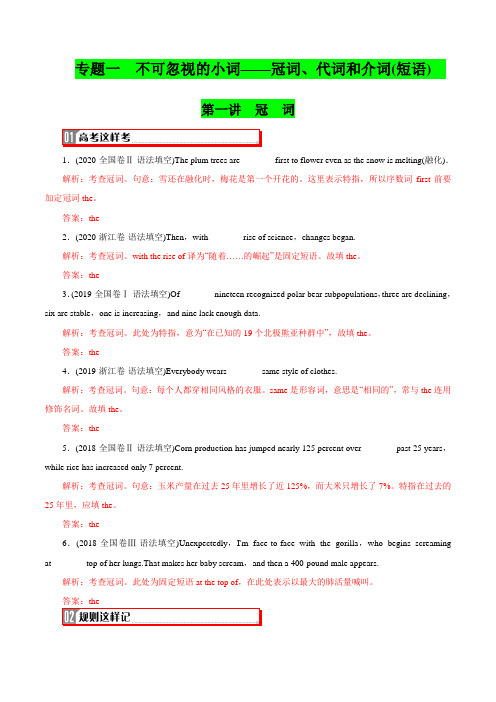
专题一不可忽视的小词——冠词、代词和介词(短语)第一讲冠词1.(2020·全国卷Ⅱ·语法填空)The plum trees are________first to flower even as the snow is melting(融化).解析:考查冠词。
句意:雪还在融化时,梅花是第一个开花的。
这里表示特指,所以序数词first前要加定冠词the。
答案:the2.(2020·浙江卷·语法填空)Then,with________rise of science,changes began.解析:考查冠词。
with the rise of译为“随着……的崛起”是固定短语。
故填the。
答案:the3.(2019·全国卷Ⅰ·语法填空)Of________nineteen recognized polar bear subpopulations,three are declining,six are stable,one is increasing,and nine lack enough data.解析:考查冠词。
此处为特指,意为“在已知的19个北极熊亚种群中”,故填the。
答案:the4.(2019·浙江卷·语法填空)Everybody wears________same style of clothes.解析:考查冠词。
句意:每个人都穿相同风格的衣服。
same是形容词,意思是“相同的”,常与the连用修饰名词。
故填the。
答案:the5.(2018·全国卷Ⅱ·语法填空)Corn production has jumped nearly 125 percent over________past 25 years,while rice has increased only 7 percent.解析:考查冠词。
冠词用法 及习题 附参考答案
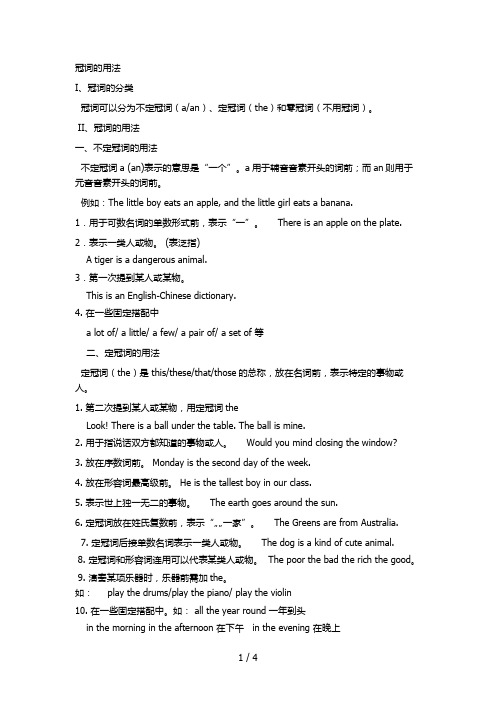
冠词的用法I、冠词的分类冠词可以分为不定冠词(a/an)、定冠词(the)和零冠词(不用冠词)。
II、冠词的用法一、不定冠词的用法不定冠词a (an)表示的意思是“一个”。
a用于辅音音素开头的词前;而an则用于元音音素开头的词前。
例如:The little boy eats an apple, and the little girl eats a banana.1.用于可数名词的单数形式前,表示“一”。
There is an apple on the plate.2.表示一类人或物。
(表泛指)A tiger is a dangerous animal.3.第一次提到某人或某物。
This is an English-Chinese dictionary.4. 在一些固定搭配中a lot of/ a little/ a few/ a pair of/ a set of 等二、定冠词的用法定冠词(the)是 this/these/that/those的总称,放在名词前,表示特定的事物或人。
1. 第二次提到某人或某物,用定冠词theLook! There is a ball under the table. The ball is mine.2. 用于指说话双方都知道的事物或人。
Would you mind closing the window?3. 放在序数词前。
Monday is the second day of the week.4. 放在形容词最高级前。
He is the tallest boy in our class.5. 表示世上独一无二的事物。
The earth goes around the sun.6. 定冠词放在姓氏复数前,表示“……一家”。
The Greens are from Australia.7. 定冠词后接单数名词表示一类人或物。
The dog is a kind of cute animal.8. 定冠词和形容词连用可以代表某类人或物。
(word完整版)冠词用法、习题及答案

冠词的用法一)冠词的定义:冠词是置于名词之前,对名词起限制作用的一种虚词。
二) 冠词的分类:冠词分为不定冠词”a,an”、定冠词"the"和零冠词三种,零冠词指的是不用冠词的情况。
1、不定冠词的用法:不定冠词表示泛指,定冠词表示特指不定冠词有”a和an"两种形式."a”用在以辅音开头的词前,"an"用在以元音开头的词前。
判断一个词是以元音开头还是以辅音开头,是根据读音而不是根据字母。
1)。
用于可数名词的单数形式前,表示”一”There is a monkey in the zoo。
动物园里有一只猴子。
2、定冠词的用法:1). 用以特指某(些)人或某(些)事物I don’t know the style[staɪl]。
我不知道这种款式。
2)。
用于指谈话双方都明确所指的人或事物Open the door, please。
请把门打开.3). 用以复述上文提过的人或事物(第一次提到用“a或an”,以后再次提到用“the”)I have a good friend. The friend is from Beijing.我有一个好朋友,这个好朋友来自于北京。
4). 用在序数词和形容词最高级前January is the first month of the year。
一月份是一年当中的第一个月。
Shanghai is the biggest city in China. 上海是中国最大的城市。
5). 表示世界上宇宙中独一无二的事物the sun 太阳 the moon 月 the earth 地球the sky 天空 the world[wɜːld]世界6). 指由普通名词构成的专有名词the West[west] Lake[leɪk] 西湖 the Great Wall 长城the United [jʊ'naɪtɪd] States[steɪts]美国the United Nations[neiʃəns]联合国7)。
冠词用法及专项练习(含答案)
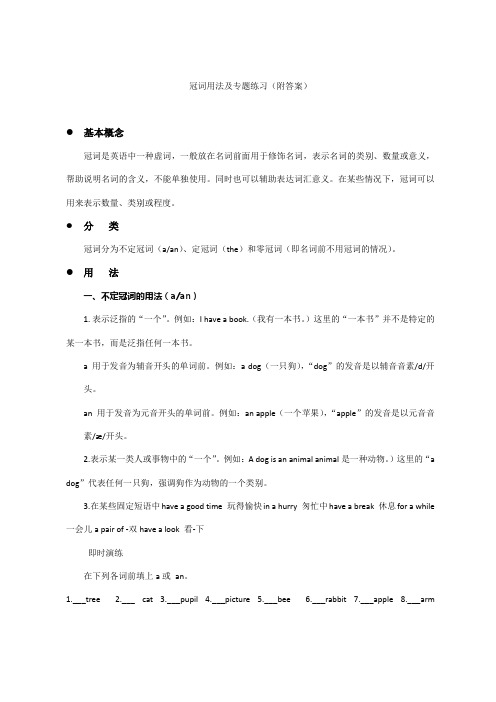
冠词用法及专题练习(附答案)●基本概念冠词是英语中一种虚词,一般放在名词前面用于修饰名词,表示名词的类别、数量或意义,帮助说明名词的含义,不能单独使用。
同时也可以辅助表达词汇意义。
在某些情况下,冠词可以用来表示数量、类别或程度。
●分类冠词分为不定冠词(a/an)、定冠词(the)和零冠词(即名词前不用冠词的情况)。
●用法一、不定冠词的用法(a/an)1.表示泛指的“一个”。
例如:I have a book.(我有一本书。
)这里的“一本书”并不是特定的某一本书,而是泛指任何一本书。
a 用于发音为辅音开头的单词前。
例如:a dog(一只狗),“dog”的发音是以辅音音素/d/开头。
an 用于发音为元音开头的单词前。
例如:an apple(一个苹果),“apple”的发音是以元音音素/æ/开头。
2.表示某一类人或事物中的“一个”。
例如:A dog is an animal animal是一种动物。
)这里的“a dog”代表任何一只狗,强调狗作为动物的一个类别。
3.在某些固定短语中have a good time 玩得愉快in a hurry 匆忙中have a break 休息for a while 一会儿a pair of -双have a look 看-下即时演练在下列各词前填上a或an。
1.___tree2.___ cat3.___pupil4.___picture5.___bee6.___rabbit7.___apple8.___arm9.___kitchen 10.___dog 11.___orange 12.___uniform 13.___unit 14.___hour 15.___honest man16.___English boy 17.___European girl 18.___university二、定冠词(the)的用法1.表示特指。
即指特定的人或事物。
例如:The book on the table is mine.(桌子上的那本书是我的。
冠词和介词用法
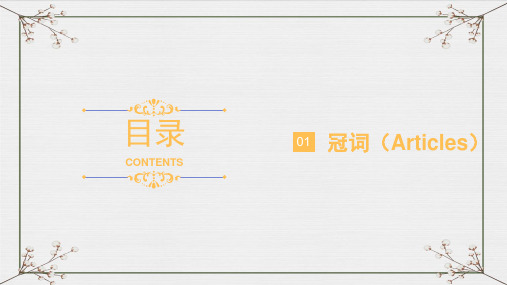
e.g. This is a useful lesson.
It's an umbrella.
26个字母中开头为元音音素发音的字母:
f /ef/, h /eɪtʃ/, l/el/, m/em/, n/en/, r /ɑː/, s/es/, x/eks/.
the United States, the Great Wall 6. 序数词或者形容词最高级前。 e.g. Mary is the third to come in.
It is the best radio station in town.
二、零冠词(即不使用冠词): 1.复数名词表示一类事物。 e.g. I like elephants.
beside 在...旁边
beside the tree 在树的旁边
near
在...附近
near the airport 机场附近
up
在...上面(向上) up those stairs 在那段楼梯上面
down 在...下面
down those stairs 在那段楼梯下面
under 在...之下
under the table 在桌子下面
about the student 关于那个学生
what / how about
at good prices 以优惠的价格
call me at... 通过...联系我
to you 给你
with my friend / with your eyes
a photo of my family 我的一张家庭照片
Hamburgers are not healthy. 2. 专有名词和不可数名词: e.g. I like milk.
冠词与介词的用法讲解及练习

冠词与介词的用法讲解一、冠词分类及其用法1.冠词的分类不定冠词:a 和an冠词定冠词: the零冠词: 不使用冠词2.不定冠词的用法(1)a用在以辅音音素开头的单词前. A useful bookan用在以元音音素开头的单词前.An egg(2)基本用法:指人或事物的某一种类e.g. She is a girl. 她是女孩.This is a desk. 这是一张书桌.(3)泛指某人或者某物,但又不具体说明何人何物.e.g. I can see a kite. 我能看见一只风筝 A boy is in Grade 1.(4)表示“数量”,“有一”“每一”的意思.e.g. We have six classes a day. 我们一天上六节课.(5)表示“同一”,相当于the samee.g The two boys are of ___an___ age.Cotton of ___a___ kind was stored together.(6)用于某些物质名词或抽象名词前,表示“一种、一类、一份、一场、一阵”.e.g That is __a__ green tea.They were caught in __a___ heavy rain.a pleasure / a success/ a failure(7)用于专有名词前表示类似的一个或某一个.e.g ______A__ Mr. Li is asking to see you at the school gate.(8)否定比较级表达最高级意义时,常用借助于不定冠词a/ an. a/ an+比较级e.g. --- What do you think of the film?--- Oh, I’ve never seen a worse one.3.定冠词的用法(1)基本用法:“特指”.特指某(些)人或者某(些)事物,以便与其他的人或物有所区别.e.g.The book on the desk is Jim’s. 书桌上的那本书是吉姆的.The chairs are there. 椅子在那里.(2)指谈话双方都知道的人或事物.e.g. Where is the kite? 风筝在哪儿?(双方都知道指的是哪只风筝.)Open the door, please.请把门打开.(双方都知道要打开哪扇门.)(3)在叙述中,上文提到过的人或者事物,再次出现时.e.g. A:I can see a kite. 我看见一只风筝B:Where is the kite?这个风筝在里?(4)用在姓氏的复数名词前,表示“一家人”e.g. the Blacks 布来克一家(5)用在宇宙间独一无二的天体名词之前.e.g.the sun the sky the moon the earth(6)用在序数词和形容词最高级,及形容词only, very, same 前.e.g. I live on the second floor.我住在二楼Skating is the best sport in winter. 滑冰是冬天最好的运动(7)用在某些建筑物和旅馆的名称之前.The Palace Museum (故宫) The Summer Palace (颐和园)(8)在江河、山脉、湖泊、海洋、群岛、海峡、海湾运河前用the。
中考英语名词、冠词、介词、形容词、副词、数词、代词使用方法及练习题
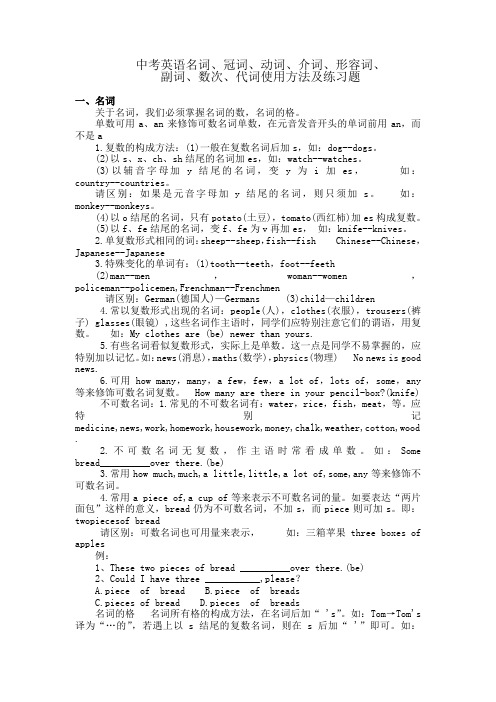
中考英语名词、冠词、动词、介词、形容词、副词、数次、代词使用方法及练习题一、名词关于名词,我们必须掌握名词的数,名词的格。
单数可用a、an来修饰可数名词单数,在元音发音开头的单词前用an,而不是a1.复数的构成方法:(1)一般在复数名词后加s,如:dog--dogs。
(2)以s、x、ch、sh结尾的名词加es,如:watch--watches。
(3)以辅音字母加y结尾的名词,变y为i加es,如:country--countries。
请区别:如果是元音字母加y结尾的名词,则只须加s。
如:monkey--monkeys。
(4)以o结尾的名词,只有potato(土豆),tomato(西红柿)加es构成复数。
(5)以f、fe结尾的名词,变f、fe为v再加es,如:knife--knives。
2.单复数形式相同的词:sheep--sheep,fish--fish Chinese--Chinese,Japanese--Japanese3.特殊变化的单词有:(1)tooth--teeth,foot--feeth(2)man--men,woman--women,policeman--policemen,Frenchman--Frenchmen请区别:German(德国人)—Germans (3)child—children4.常以复数形式出现的名词:people(人),clothes(衣服),trousers(裤子) glasses(眼镜) ,这些名词作主语时,同学们应特别注意它们的谓语,用复数。
如:My clothes are (be) newer than yours.5.有些名词看似复数形式,实际上是单数。
这一点是同学不易掌握的,应特别加以记忆。
如:news(消息),maths(数学),physics(物理) No news is goodnews.6.可用how many,many,a few,few,a lot of,lots of,some,any等来修饰可数名词复数。
英语一些介词和冠词的用法

英语一些介词和冠词的用法英语一些介词和冠词的用法最佳答案一、介词及介词短语介词像个“游离体”,名前动后常出现,一旦组成“某结构”,句中成分有一位。
“介+宾”叫“介短”,作“形、副”句里边。
“宾补、表、定、状”,都能用得上?。
“动+介”——动词性?,“及、不及物”谓语用。
成语、习语常固定,应用起来有弹性。
注 ?介词后面的名词、代词或数词是介词的宾语,介词和介词宾语合成介词短语。
介词短语在句中的语法作用相当于形容词或副词,在句中做宾(主)语、补足语、表语、定语或状语。
?“动词+介词(副词)”组成一个动词词组或短语动词,其语法作用相当于一个及物动词或不及物动词,在句中作谓语。
二、介词在句中的位置介词活跃句关键,短语合成形简单,独作成分看不见,介短表定状可担。
before时空在之前, after之后off远。
直上 over,above斜, under,below下相反。
直到till,on表面,穿过through,for因缘。
by表旁边in里面, with伴随by车船。
时间地点at、in、on,二者between多among,behind后面beside旁,附近near沿着along。
from来自like像,表示目的for,to当。
of所属周围round,向上up向下down。
三、on,at,in用法巧记on,at,in这三个常用介词都可以表示时间和地点,但具体用法不同,多数学生对它们混淆不清。
现在只要记住了口诀,就可避免at,on,in的种种误用。
1. on,in,at表示时间on“在具体某一天”?“当某时”,动名词, arrival,death前;用in一般“上”“下”“晚”;on用于天,in用于月、季、年?;限定三时in要变。
?at是个时间点,“工作”“时刻”与“圣诞”?。
at noon(night),in the day,习惯用语记心间。
注:?on表示在具体某一天及具体某一天的上午、下午和晚上。
例 On Mother's Day, we should sned flowers to our mother. 母亲节,我们应该送花给我们的母亲。
冠词的用法详解(附真题练习及答案解析)
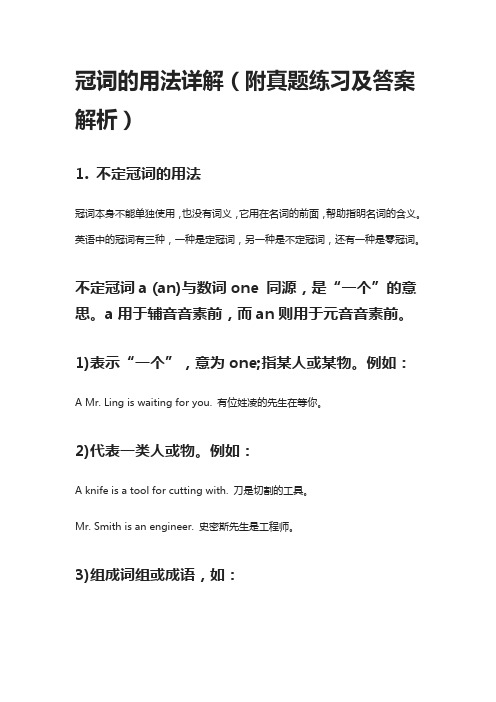
冠词的用法详解(附真题练习及答案解析)1. 不定冠词的用法冠词本身不能单独使用,也没有词义,它用在名词的前面,帮助指明名词的含义。
英语中的冠词有三种,一种是定冠词,另一种是不定冠词,还有一种是零冠词。
不定冠词a (an)与数词one 同源,是“一个”的意思。
a用于辅音音素前,而an则用于元音音素前。
1)表示“一个”,意为one;指某人或某物。
例如:A Mr. Ling is waiting for you. 有位姓凌的先生在等你。
2)代表一类人或物。
例如:A knife is a tool for cutting with. 刀是切割的工具。
Mr. Smith is an engineer. 史密斯先生是工程师。
3)组成词组或成语,如:a little / a few / a lot / a type of / a pile / a great many / many a / as a rule / in a hurry / in a minute / in a word / in a short while / after a while / have a cold / have a try /keep an eye on / all of a sudden等。
2. 定冠词的用法定冠词the与指示代词this,that同源,有“那(这)个”的意思,但意义较弱,可以和一个名词连用,来表示某个或某些特定的人或东西。
1)特指双方都明白的人或物。
例如:Take the medicine. 把药吃了。
2)上文提到过的人或事。
例如:He bought a house. I’ve been to the house.他买了幢房子。
我去过那幢房子。
3)指世上独一无二的事物,如:the sun,the sky,the moon,the earth等。
4)与单数名词连用表示一类事或物,如:the dollar 美元; the fox 狐狸;或与形容词或分词连用,表示一类人:the rich 富人; the living 生者。
介词at,in,on的区别和冠词中不定冠词的用法说明-高考英语一轮复习

介词at,in,on的区别1. 表示時间,注意以下用法:(1)表示时间的某一点、某一时刻或年龄等用at。
如:I get up at six in the morning.我早上六点钟起床。
He got married at the age of 25.他25 岁结婚。
(2)泛指一般意义的上午、下午或晚上以及月或年等较长的时间,一般用in。
如:We watch TV in the evening.我们晚上看电视。
He went to Japan in 1946. 他于1946 去了日本。
(3)若表示星期几或某一特定的日期,则用on。
如:He left here on the fifth of May. 他于5 月5 日离开这儿。
2. 表示地点、场所、位置等,注意以下用法:(1)表示某一点位置,用at。
如:We live at NO. 87 Beijing Road. 我们住在北京路87 号。
The hospital is at the end of the street. 医院在这条街的尽头。
与名词所有格连用表示地点,也用at。
如:at my sisters 在我姐姐家at the doctors 在医务室(2)表示空间或范围,用in。
如:What’s in the box?这盒子里有什么?He lives in Paris with his wife. 他同他妻子住在巴黎。
但有时两者可换用。
如:The meeting was held at [in] the hotel. 会议在宾馆举行。
(3)at 与in 的另一个区别是:at 用于指较小的地方,而in 用于指较大的地方。
如:in Shanghai 在上海at the station 在车站但是,大与小是相对的,有时随着说话者的着眼点不同,大地方也可能用at(比如把一个大地方看作一个点时)。
如:Our plane refueled at London. 我们的飞机在伦敦加油。
介词和冠词在句子中的位置和用法

介词和冠词在句子中的位置和用法在英语句子中,介词和冠词是两个重要的语法成分,它们在句子中的位置和用法对于句子的意思和表达都有着重要的影响。
本文将详细介绍介词和冠词在句子中的位置和用法。
一、介词的位置和用法介词是一种虚词,用来表示名词或代词与其他成分之间的关系。
介词通常位于名词或代词之前,连接名词或代词与其他成分。
1. 介词的位置介词通常位于名词或代词之前,例如:- I went to the park.(我去了公园。
)- He is studying for the exam.(他正在备考。
)2. 介词的用法介词可以表示时间、地点、原因、目的等不同的意义。
以下是一些常用的介词及其用法:- In(在):用于表示时间、地点等,例如:in the morning(在早上)、in the city(在城市中)。
- On(在、在上面):用于表示时间、地点等,例如:on Monday (在星期一)、on the table(在桌子上)。
- At(在、在...时候):用于表示时间、地点等,例如:at 7 o'clock (在7点钟)、at the airport(在机场)。
- With(和):用于表示伴随、方式等。
例如:I went to the cinema with my friends.(我和我的朋友一起去了电影院。
)二、冠词的位置和用法冠词是一种限定词,用来限定名词或名词短语的用法,包括定冠词(the)和不定冠词(a/an)两种。
1. 定冠词的位置定冠词the通常位于名词之前,例如:- The book is on the table.(这本书在桌子上。
)- The boy is playing in the park.(那个男孩在公园里玩。
)2. 不定冠词的位置不定冠词a/an通常位于名词之前,例如:- I saw a cat on the street.(我在街上看到一只猫。
)- She wants to be an actress.(她想成为一名演员。
初中英语十大词性详解和练习
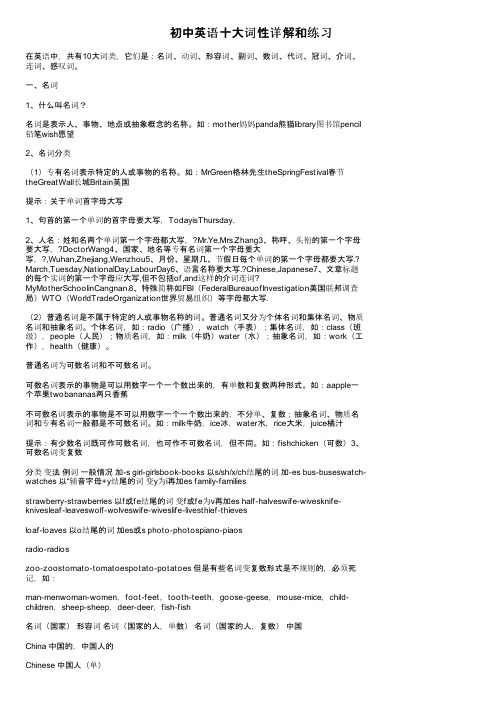
初中英语十大词性详解和练习在英语中,共有10大词类,它们是:名词、动词、形容词、副词、数词、代词、冠词、介词、连词、感叹词。
一、名词1、什么叫名词?名词是表示人、事物、地点或抽象概念的名称。
如:mother妈妈panda熊猫library图书馆pencil 铅笔wish愿望2、名词分类(1)专有名词表示特定的人或事物的名称。
如:MrGreen格林先生theSpringFestival春节theGreatWall长城Britain英国提示:关于单词首字母大写1、句首的第一个单词的首字母要大写,TodayisThursday.2、人名:姓和名两个单词第一个字母都大写,?Mr.Ye,Mrs.Zhang3、称呼、头衔的第一个字母要大写,?DoctorWang4、国家、地名等专有名词第一个字母要大写,?,Wuhan,Zhejiang,Wenzhou5、月份、星期几、节假日每个单词的第一个字母都要大写.? March,Tuesday,NationalDay,LabourDay6、语言名称要大写.?Chinese,Japanese7、文章标题的每个实词的第一个字母应大写,但不包括of,and这样的介词连词? MyMotherSchoolinCangnan.8、特殊简称如FBI(FederalBureauofInvestigation美国联邦调查局)WTO(WorldTradeOrganization世界贸易组织)等字母都大写.(2)普通名词是不属于特定的人或事物名称的词。
普通名词又分为个体名词和集体名词、物质名词和抽象名词。
个体名词,如:radio(广播),watch(手表);集体名词,如:class(班级),people(人民);物质名词,如:milk(牛奶)water(水);抽象名词,如:work(工作),health(健康)。
普通名词为可数名词和不可数名词。
可数名词表示的事物是可以用数字一个一个数出来的,有单数和复数两种形式。
中考英语语法第一轮复习之冠词与介词 (3)
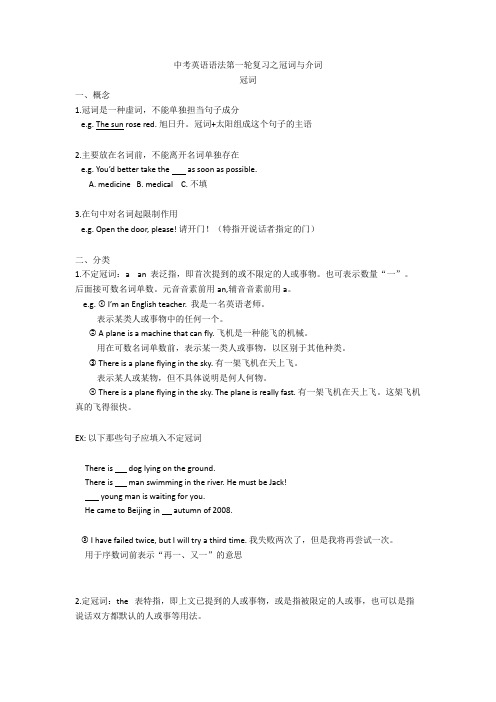
中考英语语法第一轮复习之冠词与介词冠词一、概念1.冠词是一种虚词,不能单独担当句子成分e.g. The sun rose red. 旭日升。
冠词+太阳组成这个句子的主语2.主要放在名词前,不能离开名词单独存在e.g. You’d better take the as soon as possible.A. medicineB. medicalC. 不填3.在句中对名词起限制作用e.g. Open the door, please! 请开门!(特指开说话者指定的门)二、分类1.不定冠词:a an 表泛指,即首次提到的或不限定的人或事物。
也可表示数量“一”。
后面接可数名词单数。
元音音素前用an,辅音音素前用a。
e.g. ① I’m an English teacher. 我是一名英语老师。
表示某类人或事物中的任何一个。
② A plane is a machine that can fly. 飞机是一种能飞的机械。
用在可数名词单数前,表示某一类人或事物,以区别于其他种类。
③ There is a plane flying in the sky. 有一架飞机在天上飞。
表示某人或某物,但不具体说明是何人何物。
④ There is a plane flying in the sky. The plane is really fast. 有一架飞机在天上飞。
这架飞机真的飞得很快。
EX: 以下那些句子应填入不定冠词There is dog lying on the ground.There is man swimming in the river. He must be Jack!young man is waiting for you.He came to Beijing in autumn of 2008.⑤ I have failed twice, but I will try a third time. 我失败两次了,但是我将再尝试一次。
冠词用法、练习题含答案

冠词用法、练习题含答案冠词分三种:定冠词the,零冠词/,不定冠词a/an.一、定冠词the的用法:①特指某些人或物②谈话双方都熟悉的人或事③上文已经提到的人或事④世界上独一无二的事物前⑤序数词回形容词最高级前⑥某些专有名词前⑦一些习惯短语(如:intheday等)中和乐器前(如:playtheviolin/piano)二、不用冠词(零冠词)①名词前已有作定语用的this、that、some、any、my等限定词。
②专有名词和不可数名词前。
③表示学科的名词前。
④球类活动的名词前及三餐总称前。
⑤复数名词表示泛指(一类人或事)时。
⑥节日、季节、星期、月份前。
⑦表示颜色、语种和国家的非全称名词。
⑧在称呼或表示头衔的名词前。
⑨某些习惯短语中(如:inbed、gotoschool等)。
冠词用法口诀:口诀一名词是秃子常要戴帽子可数名词单需用a或an辅音前用a元音前用an复数不可数泛指the不见碰到代词时,冠词均不现。
口诀二(定冠词)特指双熟悉上文已提及世上独无二序数最高级某些专有名习语和乐器。
口诀三(零冠词)代词限定名词前专有名词不可数学科球类三餐饭两季星期月份前颜色语种和国名称呼习语和头衔。
一、根据语境用适当的冠词填空,用零冠词的地方划“/”。
1.The Changjiang is _____ longest river in our country.2.Here is a picture of a modern car factory. My father works in _____ factory. 3.______ girl in red is my sister.4.Can you see _____ sun in the sky?5.He used to be _____ engineer.6.Give me _____ pen, please.7.______ underground train can start and stop quickly.8._____ boy is waiting for me.9.A dictionary is _____ useful book.10.119 is _____ telephone number.11.There is ____ “R” in the word “red”.12.Her parents lived in a small far away village in _______ north.13.It's _______ dream come true for me.14.I have ________ uncle and he is a teacher.15.She has a pen. ________ pen is blue.16.Please don’t shout at her. She is only____eight-year-old girl.17.—Have you read a book called The Merchant of Venice?—Yes.___________book is very interesting.18.Qu Dongyu is ________ official(官员) of the United Nations, who is from Yongzhou.19.The boy went to school by_________, but there was a road accident. 20.—John and I will(将) go to the movie My People My Country (《我和我的祖国》)”—It's raining outside. You'd better(最好) take________ umbrella to the cinema. 21.It is unusual for an armless boy to play ___________ piano so well with his feet. 22.—Do you like ________ movie Sing?—Yes. I think it's ________ most interesting movie this year.23.My brother was good at playing ________ football when he was young. 24.After ________ quick lunch, Harry ran to school.25.—Who's ________ boy in black over there?—My cousin Mike. He is ________ friendly boy.26.It's ________ interesting story for all the children.27.________ Smiths are having ________ lunch now.28.My mum plays ________ piano very well.29.—Does John go to school by ________ bike?—No. He takes ________ bus.30.There is __________ picture of __________ elephant on __________ wall. 31.This is __________ useful book. I’ve read it for __________ hour.32.__________ elephant is much heavier than __________ horse.33.__________ doctor told him to take __________ medicine three times ______ day.34.Let’s go out for __________ walk.35.It’s too hot. Open __________ door, please.36.There is __________ woman over there, __________ woman is Meimei’s mother.37.__________ sun rises in __________ east.38.__________ Changjiang River is __________ longest river in __________ China.39.Are you going to do it __________ second time?【参考答案】1.The 2.The 3.The 4.The 5.An 6.A 7.An 8.A 9.a 10.a 11.An 12.The 13.A 14.An 15.The 16.An 17.The 18.An 19.bus/bike 20.An 21.the 22. the the 23./ 24.a 25. the a 26.An 27. The / 28.The 29. / a / the30. a an the 31. a an 32. An a 33. The the a 34.a 35.The 36. a the 37. The the38. The the × 39.a二、单选题1.Eric wants to study medicine at ________ university when he grows up.A.a B.an C.the D./2.—Jeff, what’s _________matter with you?—I have a cough, so I have to see a doctor.A.a B.an C.the D./3.—There was ________ interview with Doctor Li on TV.—Yes. I admire (钦佩) her more after watching ________ interview.A.a; the B.an; the C.the; an D.an; an4.This is ________ Asian animal and it eats meat.A.a B.an C.the D./5.This is _______ eraser and ________ eraser is white.A.a; the B.an; an C.an; the6.I have ________ story book. ________ book is interesting.A.a;An B.a;The C.an;The D.the;The7.— Why do you like Bob?— Because he is __________ honest boy. He never tells lies.A.a B.an C.the D./8.— TikTok is ________ popular app among the young. Do you know the reason?— People can enjoy different kinds of videos through ________ app.A.the; an B.a; an C.a; the D.an; the9.This is _________ interesting movie that we all like to watch it.A.such an B.so an C.a such10.—There will be _____ one-hour documentary tonight on TV.—Yes, it tells a story of _____ honest boy in the mountain village far away. A.an; an B.an; a C.a; an D.the; a11.My mother says English is ________ useful subject.A.a B.an C.the D./12.Miller had ________ interest in soccer when he was ten. He practiced it very hard and soon he made ________ soccer team.A.a, a B.an, an C.the, the D.an, the13.—I left my homework at home and my teacher got very angry with me yesterday.—What ________ awful day it was!A.a B.an C.the D./14.Every day, my father plays ______ basketball for ______ hour.A./; an B.the; a C.a; a D./ ; the 15.Yancheng Nature Reserve covers ________ area of over 4,530 square kilometers.A.a B.an C.the D./16.My friend wants to be ________ engineer, so she is going to study math. A.the B.a C.an17.The Oxford English Dictionary is ________ useful tool(工具)for ________ English learner.A.an, an B.a, an C.the, a D./,the18.—Look, what’s on ________ table?—It’s ________ ora nge.A.a; an B.the; an C.the; /19.Emma is _________ Australian girl. She studies in __________ Chinese school. A.a; an B.an; a C.a; a D.an; an 20.—Jim, what do you want to be when you grow up?—I want to be ________ engineer.A./ B.the C.a D.an21.This is ________ useful article on how to be ________ honest man.A.a, the B.an, the C.an, an D.a, an22.When we’re on the road, we must pay attention to the risk of ________ accident.A.a B.an C.the23.—You can take ________ subway to the museum.—No, I will go there by ________ bus.A./; the B.the; / C.the; the D.a; a24.Chinese is ________ useful subject,and I study it for ________ hour every day.A.а; a B.an; an C.an; a D.a; an25.—Do you want to watch ________ movie with me?—Yes, we can go to ________ one on Long Street.A.a; the B.an; the C.a; a D.an; a 26.—Look, who’s ________ woman in red?—She’s my new English teacher with ________ eight-year-old daughter.A.the; a B.a; an C.the; an D.the; the27.—Do you like playing ________ violin?—No, I like surfing ________ Internet.A.the; / B.a; the C./; the D.the; the 28.Once upon _______ time, there was ________ honest man living in a forest. A.a ; an B.an ; a C.the ; a D.a ; the 29.—Could you please tell me where to park my car?—Sure. There is ________ underground parking lot over there.A.a B.an C.the D./30.Simon and Daniel are brothers. There is ________ uncommon similarity between ________ two boys.A.an; / B.an; the C.a; / D.a; the31.Jack is such _________ friendly boy. He gets along well with his classmates. A.a B.an C.the32.Chongqing, ________ active city, has developed friendship with many citiesand areas.A.a B.an C.the D./33.Zhang Ming is _____11-year-old boy, but he can play _______ football very well.A.a; the B.an; / C.an; the D.a; /34.There’s ________ mall near my house. ________ mall sells the best clothes A.a; A B.the; The C.the; A D.a; The35.Once there was ________ emperor and ________ emperor liked beautiful clothes very much.A.the; a B.an; an C.an; the D.a; the36.I read _______ unusual story last night. _______ story is about Zhong Nanshan.A.a; A B.an; The C.an; A D.the; A37.—Do you know ________ girl with long curly hair?—Yes, she is Mary. She plays ________ violin very well.A.a;/ B.the;/ C.the; the D.a; the 38.—You drop ________ “s”in the word “cross”.—Oh. ________ letter “s” should be doubled like “cross”.A.a; A B.an; A C.the; The D.an; The 39.Zheng Zhi can play ________ football, but he can’t play ________ guitar. A.the; the B./; the C.the; / D./; /40.________ Spring Festival is more important than ________ other festivals in China.A.The; / B./; the C.The; the D./; /41.Do you know ________ an “o” and ________ “u” in the word “computer”? A.there is; an B.is there; an C.there is; a D.is there ; a 42.My cousin Paul can play ______ tennis but he can’t play ______ guitar. A.the; the B./; / C./ ; the43.This is ________ English book. ________ English book is blue.A.a;The B.an;The C.an;An D.the;The 44.—Have you seen ________ film The Battle at Lake Changjin?—Yes, I have never seen ________ better film than before.A.the; a B.a; the C.the; / D.a; /45.—I don't like either of the sweaters. Can I try on a __________one?—OK, wait a minute.A.second B.third C.fourth46.There is big white bear in thezoo. bear is from Russia.A.a; A B.a; The C.the; The47.In China, it’s impolite to hit ________ empty bowl with your chopsticks. A.a B.an C./ D.the48.He has a toothache. He should see a dentist and get ________ X-ray.A.a B.an C.the D./49.—Can you play ________ guitar?—Sure. It’s a piece of cake for me.A.a B.an C.the50.I like playing ________ piano, but my brother likes playing ________ table tennis.A.an; the B./; an C.a; / D.the; / 51.—What’s ________ matter?—I didn’t sleep well yesterday. I have ________ bad headache now.A./, a B.a, the C.the, a52.I hope I can make ________ good impression on my new friend.A./ B.a C.an D.the53.—Are you satisfied with your result of the PE examination?—Not at all. I can’t have ________one.A.a worse B.a better C.the worst D.the best 54.—Do you know _______ girl in a white dress in this picture?—She is Meng Ran, _______ excellent singer.A.a; the B.a; an C.the; an D.a; / 55.—What’s this in English?—It’s ________ orange.A.a B.an C.the D.不填56.They have ________ school trip and ________ English party this month. A.a; a B.a; an C.an; an D.an; a57.—Shall we try ________ newly-created dish Chocolate Planet in Sunny Restaurant?—OK. Let’s go this afternoon.A.a B.an C.the D./58.You must wear a helmet (头盔) while riding an E-bike on the road at________ present.A.a B.an C.the D./59.I have ________ uncle. He must wear ________ uniform at work.A.a,an B.an,a C.a,a D.an,an60.The 10th China Flower Expo opened on Chongming Island on May 21st._________ exciting event!A.What B.How C.What a D.What an 61.Millie likes playing ________ guitar, but she doesn’t like playing________ basketball.A.the, the B.the, / C./, /62.I have ________ useful guidebook. I borrowed it from my best friend.A.an B./ C.a D.the63.Take ________ look at the film guide. There are six films on at City Cinema. A./ B.the C.a D.an64.Lily is_________ active girl and she likes playing _________ volleyball. A.a; / B.a; the C.an; / D.an; the 65.—Who is ________ boy in blue?—He is Jim Brown. We are in ________ same club.A.a; the B.the; the C.a, / D.the, /66.— Would you please give me ________ clean spoon?—Wait a minute. I’ll go and get one for you.A.a B.an C.the D./67.I have ________ egg and a glass of milk for ________ breakfast every day. A.an; / B.a; / C.an; the D.a; the68.I often play ________ pipa. Sometimes I play ________ football.A./; / B.the; the C.the; /69.—My son sometimes goes to school without having __________ breakfast.—Tell him it is __________ unhealthy habit (习惯).A./; an B.the; an C./; a D.the; a70.________ Monday afternoon, we have ________ English lesson.A.In; a B.In; an C.On; a D.On; an71.Andy is studying math in ________ university. He wants to be________ engineer.A.a;a B.an;an C.a;an D.an;a 72.—Excuse me, I need ________ skirt.—Oh, what about ________ red one on the table? It’s on sale.A.a;a B.an;a C.a;the D.an;the73.He sometimes goes to ________ movies ________ weekends.A./, on B./, at C.the, at D.the, in74.Paul has ________ tennis ball, but he doesn’t play ________ tennis.A.a; a B.the; / C.a; / D./; a75.Through hard work, Spud Webb finally became ________ NBA player.A.a B.the C.an D./76.________ terrible mess it is outside!A.How B.What a C.What an D.What77.Eddie has ________ e-dog, and ________ e-dog is very interesting.A.a; a B.an; an C.an; the D.the; an78.— Do you know _______ young man living next door?— Sure, he is very kind and always supports kids in poor areas.A.a B.an C.the D./79.We stayed at ________ very nice hotel, but I can’t remember ________ name. A.a, a B.the, the C.a, the D.the, a80.What ________ useful advice he gave us at the beginning of the new year! A.a B./ C.an81.There was _________ accident on Green Street last night. A woman lost her life in the accident.A.a B.an C./ D.the82.Jerry had to catch the early bus, so he had ________ quick breakfast.A.the B.a C./ D.an83.—What’s the matter with Judy?—She has ________ cold.A.a B.an C.the D./84.—________ useful advice you have given me!—I hope you will make ________ great progress.A.What a; a B.What; / C.How a; / D.How; a85.—Hi, Tom, did you watch Tiangong Classroom?—Yes, it’s _________ amazing lesson. I enjoyed watching the experiments.A.a B.an C.the D./86.On May 14, a tornado (龙卷风) hit Shengze Town, Suzhou. ________ disaster caused ________ power cut in the town.A.A; a B.A; the C.The; a D.The; / 87.—What are you looking for, Cindy?—I can’t find ________ storybook I borrowed from the library.A.a B.an C.the D./88.—Have you ever seen the film A Little Red Flower?—Yes, I have. It tells us ________ unusual life experience of a boy called Wei Yihang.A.an B.a C.the D./89.Mr. Smith lives on ________ floor. To keep healthy, he walks upstairs every day.A.the eighth B.the eight C.eight90.It takes Tim only ten minutes ________ breakfast every morning.A.to have B.to have the C.having D.having the【参考答案】二、单选题1.A解析:A【解析】【详解】句意:埃里克长大后想进大学学医。
中考英语《冠词、数词、介词与连词》考点详解
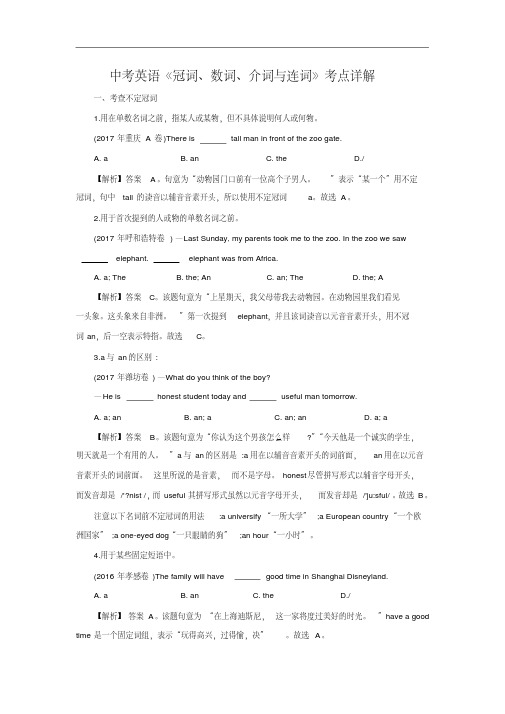
中考英语《冠词、数词、介词与连词》考点详解一、考查不定冠词1.用在单数名词之前,指某人或某物,但不具体说明何人或何物。
(2017年重庆A卷)There is tall man in front of the zoo gate.A. aB. anC. theD./【解析】答案A。
句意为“动物园门口前有一位高个子男人。
”表示“某一个”用不定冠词,句中tall的读音以辅音音素开头,所以使用不定冠词a。
故选A。
2.用于首次提到的人或物的单数名词之前。
(2017年呼和浩特卷)—Last Sunday, my parents took me to the zoo. In the zoo we saw elephant. elephant was from Africa.A. a; TheB. the; AnC. an; TheD. the; A【解析】答案C。
该题句意为“上星期天,我父母带我去动物园。
在动物园里我们看见一头象。
这头象来自非洲。
”第一次提到elephant,并且该词读音以元音音素开头,用不冠词an,后一空表示特指。
故选C。
3.a与an的区别:(2017年潍坊卷)—What do you think of the boy?—He is honest student today and useful man tomorrow.A. a; anB. an; aC. an; anD. a; a【解析】答案B。
该题句意为“你认为这个男孩怎么样?”“今天他是一个诚实的学生,明天就是一个有用的人。
”a与an的区别是:a用在以辅音音素开头的词前面,an用在以元音音素开头的词前面。
这里所说的是音素,而不是字母。
honest尽管拼写形式以辅音字母开头,而发音却是/'?nist /,而useful其拼写形式虽然以元音字母开头,而发音却是/'ju:sful/。
故选B。
注意以下名词前不定冠词的用法:a universify“一所大学”;a European country“一个欧洲国家”;a one-eyed dog“一只眼睛的狗”;an hour“一小时”。
中考冠词和介词专题2
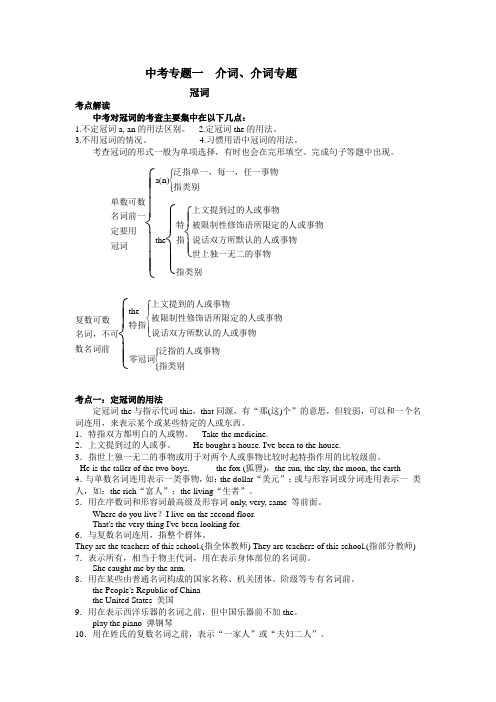
中考专题一 介词、介词专题冠词考点解读中考对冠词的考查主要集中在以下几点:1.不定冠词a, an 的用法区别。
2.定冠词the 的用法。
3.不用冠词的情况。
4.习惯用语中冠词的用法。
考查冠词的形式一般为单项选择,有时也会在完形填空、完成句子等题中出现。
单数可数名词前一定要用冠词⎩⎪⎪⎨⎪⎪⎧ a (n )⎩⎪⎨⎪⎧ 泛指单一,每一,任一事物指类别the ⎩⎪⎨⎪⎧ 特指⎩⎪⎨⎪⎧ 上文提到过的人或事物被限制性修饰语所限定的人或事物说话双方所默认的人或事物世上独一无二的事物指类别复数可数名词,不可数名词前⎩⎪⎨⎪⎧ the 特指⎩⎪⎨⎪⎧ 上文提到的人或事物被限制性修饰语所限定的人或事物说话双方所默认的人或事物零冠词⎩⎪⎨⎪⎧ 泛指的人或事物指类别考点一:定冠词的用法定冠词the 与指示代词this ,that 同源,有“那(这)个”的意思,但较弱,可以和一个名词连用,来表示某个或某些特定的人或东西。
1.特指双方都明白的人或物。
Take the medicine.2.上文提到过的人或事。
He bought a house. I've been to the house.3.指世上独一无二的事物或用于对两个人或事物比较时起特指作用的比较级前。
He is the taller of the two boys. the fox (狐狸),the sun, the sky, the moon, the earth4.与单数名词连用表示一类事物,如:the dollar “美元”;或与形容词或分词连用表示一 类人,如:the rich “富人”;the living “生者”。
5.用在序数词和形容词最高级及形容词only, very, same 等前面。
Where do you live ?I live on the second floor.That's the very thing I've been looking for.6.与复数名词连用,指整个群体。
冠词和方位介词的讲解

冠词(a,an,the),方位介词的用法I、冠词分为不定冠词(a, an),定冠词(the),和零冠词。
一、不定冠词(a/an)的用法:a用于辅音前;an用于元音前。
请注意以下2点:1. 拼写以辅音字母开头读音却以元音开头的单词hour['ɔnə], honest, honor等单词的拼写虽然以辅音字母h开头,但其读音却以元音开头,因此,前面要用等单词的拼写虽然以辅音字母an。
可熟记下面这句话:An hour ago, an honest man accepted an honorable task. (一小时前,一位诚实的人接受了一项光荣的任务。
2.拼写以元音字母开头读音却以辅音开头的单词useful ['ju:sful], university, usual, European, united, one-eyed['wʌn'aid], one-way等单词的拼写虽然以元音字母开头,但其读音却以元音开头,因此,前面要用a等单词的拼写虽然以元音字母开头,但其读音却以辅音开头。
可熟记下面这句话:In a university, a European and a one-eyed man walk along a one-way road with a usual tool. This is a usual thing. (在一所大学里,有一个欧洲人和一个独眼龙拿着有用的工具沿着一条单行道行走,这是件平常的事。
不定冠词的记忆口诀:冠词a, an两种帽,单数可数名词要;选帽只要听读音,不看字母能做到;元音因素来开头,一定需要选an帽;辅音因素带a帽,记住规律莫乱套。
二、定冠词的用法:定冠词记忆口诀:特指双方熟悉,上文已经提及;世上独一无二,方位西洋乐器;某些专有名词,外加复数姓氏;序数词最高级,习惯用语要特记。
三、零冠词的用法:零冠词记忆口诀:下列情况应免冠,代词限定名词前;专有名词不可数,学科球类三餐饭;复数名词表泛指,两节星期月份前;颜色语种和国名,称呼习语及头衔。
小学五年级重要知识归纳冠词与介词的选择与用法
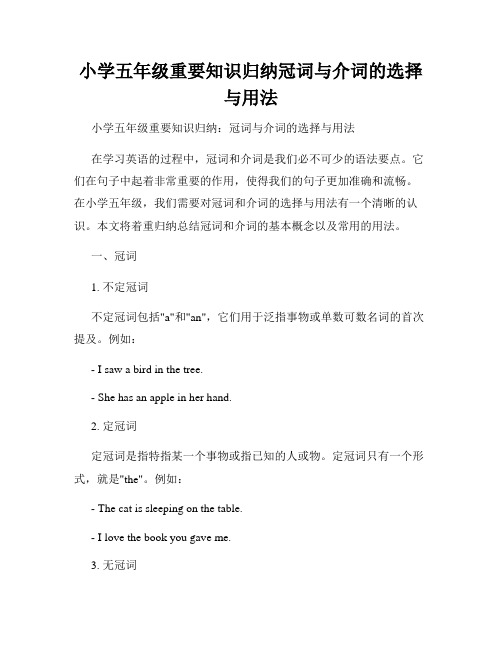
小学五年级重要知识归纳冠词与介词的选择与用法小学五年级重要知识归纳:冠词与介词的选择与用法在学习英语的过程中,冠词和介词是我们必不可少的语法要点。
它们在句子中起着非常重要的作用,使得我们的句子更加准确和流畅。
在小学五年级,我们需要对冠词和介词的选择与用法有一个清晰的认识。
本文将着重归纳总结冠词和介词的基本概念以及常用的用法。
一、冠词1. 不定冠词不定冠词包括"a"和"an",它们用于泛指事物或单数可数名词的首次提及。
例如:- I saw a bird in the tree.- She has an apple in her hand.2. 定冠词定冠词是指特指某一个事物或指已知的人或物。
定冠词只有一个形式,就是"the"。
例如:- The cat is sleeping on the table.- I love the book you gave me.3. 无冠词有时候句子中并不需要冠词来修饰名词,特别是在一些不可数名词和复数名词的情况下。
例如:- I like dogs.- Water is essential for life.二、介词介词是连接词与其他词或短语的一种词类,它们常常用来描述时间、地点、方式、原因等等。
以下是一些常见介词的用法:1. 时间介词- On:在某一天、日期或特定时间点上。
例如:on Monday, on April 1st, on a sunny day.- In:在某个特定年、月、季节或一段时间上。
例如:in 2020, in August, in the morning.- At:在某一具体时刻、某一特定时间上。
例如:at 7 o'clock, at noon, at bedtime.2. 地点介词- In:在较大的地方、国家或地区上。
例如:in China, in a city, in the park.- On:在较小的地方、面板或建筑物上。
- 1、下载文档前请自行甄别文档内容的完整性,平台不提供额外的编辑、内容补充、找答案等附加服务。
- 2、"仅部分预览"的文档,不可在线预览部分如存在完整性等问题,可反馈申请退款(可完整预览的文档不适用该条件!)。
- 3、如文档侵犯您的权益,请联系客服反馈,我们会尽快为您处理(人工客服工作时间:9:00-18:30)。
冠词与介词的用法讲解一、冠词分类及其用法1.冠词的分类不定冠词:a 和an冠词定冠词: the零冠词: 不使用冠词2.不定冠词的用法(1)a用在以辅音音素开头的单词前. A useful bookan用在以元音音素开头的单词前.An egg(2)基本用法:指人或事物的某一种类e.g. She is a girl. 她是女孩.This is a desk. 这是一张书桌.(3)泛指某人或者某物,但又不具体说明何人何物.e.g. I can see a kite. 我能看见一只风筝 A boy is in Grade 1.(4)表示“数量”,“有一”“每一”的意思.e.g. We have six classes a day. 我们一天上六节课.(5)表示“同一”,相当于the samee.g The two boys are of ___an___ age.Cotton of ___a___ kind was stored together.(6)用于某些物质名词或抽象名词前,表示“一种、一类、一份、一场、一阵”.e.g That is __a__ green tea.They were caught in __a___ heavy rain.a pleasure / a success/ a failure(7)用于专有名词前表示类似的一个或某一个.e.g ______A__ Mr. Li is asking to see you at the school gate.(8)否定比较级表达最高级意义时,常用借助于不定冠词a/ an. a/ an+比较级e.g. --- What do you think of the film?--- Oh, I’ve never seen a worse one.3.定冠词的用法(1)基本用法:“特指”.特指某(些)人或者某(些)事物,以便与其他的人或物有所区别.e.g.The book on the desk is Jim’s. 书桌上的那本书是吉姆的.The chairs are there. 椅子在那里.(2)指谈话双方都知道的人或事物.e.g. Where is the kite? 风筝在哪儿?(双方都知道指的是哪只风筝.)Open the door, please.请把门打开.(双方都知道要打开哪扇门.)(3)在叙述中,上文提到过的人或者事物,再次出现时.e.g. A:I can see a kite. 我看见一只风筝B:Where is the kite?这个风筝在里?(4)用在姓氏的复数名词前,表示“一家人”e.g. the Blacks 布来克一家(5)用在宇宙间独一无二的天体名词之前.e.g.the sun the sky the moon the earth(6)用在序数词和形容词最高级,及形容词only, very, same 前.e.g. I live on the second floor.我住在二楼Skating is the best sport in winter. 滑冰是冬天最好的运动(7)用在某些建筑物和旅馆的名称之前.The Palace Museum (故宫) The Summer Palace (颐和园)(8)在江河、山脉、湖泊、海洋、群岛、海峡、海湾运河前用the。
the Changjang River 长江/the Hudson River 哈得孙河/the West Lake 西湖(9)用在表示乐器的名词之前.e.g. play the violin play the piano(10)用在一些习惯用语中e.g.in the dayin the morning / afternoon/ eveningthe day before tomorrow/ yesterdaythe next morning / week/ month/ yearin the sky/ water/ field/ country4.零冠词的用法(1)名词前有了物主代词、指示代词、不定代词和“S”所有格时。
e.g. Our books those apples Jim’s pen(2)复数名词在表示一类人或者事物时。
e.g. They are teachers. 他们是老师。
(3)在专有名词前 e.g. China England(4)在星期、月份、带day的节日前e.g. on Sunday in August on Children’s Day /woman’s day请区别:in the spring of 1945 (特指,加the )(5)三餐前不加冠词,但特指须加,有时也可以加a 表示一顿。
e.g. have supperWhat do you usually have for lunch?We had a really good dinner.(特指)(6)在一些固定搭配中e.g. at night, go to school ,at table ,by bike,at work,go to bedat school,at home, watch TV,play football/ basketball(7)表示独一无二的职位、职务的名词用作表语、同位语或补足语时,常见名词有president, chairman, mayor, head, boss, secretary, leader, monitor等。
e.g. He was made monitor yesterday.(8)表示交通工具的名词与by连用.当bike,car,taxi,bus,train,foot,ship等与介词by连用,表示一种交通手段是,不用the。
e.g.Did you come back by plane or by train?注意:还有by water,by land,by sea,by air,on foot,On horse back 等。
但take a bus,on the bike,in a boat等需加冠词。
(9)两个名词同指一个人或事物时,后面的名词前不用冠词.e.g The teacher and writer has come to the meeting.(10)表示颜色、语种、国家前不用冠词* in purple紫色* in red * in English /Chinese *in Britain二、介词的用法1.时间介词in/ at/ on(1)介词in表示较长时间如:世纪、年代、年份、月份、季节、上午/下午/晚上以及一些习惯用法。
e.g. in 1999 /in Winter/in the morning(2)介词at表示某一时间点如:钟点、年龄、中午/夜晚/子夜、就餐时间或其它的习惯用法。
e.g. at 2:30/at the age of 25/at midday/At dinner time(3)介词on表示某一天或者特定的时间如:星期、某月某日、某年某月某日、含Day的节日、有修饰上午/下午/晚上以及一些习惯用法。
2.地点介词in /on /atIn [表示地点、场所、位置等]在…里面;在…内部;在…上:例句: in the room on 在…表面上,在…之上:例句: a glass on the deskat [表示存在或出现的地点、场所、位置、空间]在(某地),在…里;在…上;在…旁,接近…,靠近(某处):例句: at home 在家at the office 在办公室over 在……的正上方,垂直上方,不接触表面above 在……上方,不强调是否垂直练习:1.Look! There is a bridge __the river.A. onB. overC. above2.Can you see the egg ___ the plate?A. onB. atC. over3.We live ___ a small bookstore.A. onB. overC. above5.The sun rose ___the horizon(地平线).A. onB. aboveC. over注意: on 接触平面over 在平面的正上方above 在上方under 在……正下方(是on, over的反义词)below 在……下方,不强调垂直,是above的反义词6. The temperature will fall__ zero at night.A. belowB. aboveC. over7.They were playing chess __ the tree.A. onB. aboveC. Under注意:in front of 是在物体外部的前面in the front of 是在物体内部的前面e.g. There is a garden in front of the classroom. 教室前有个花园。
There is a desk in the front of the classroom. 教室前有张桌子。
3.运动介词through 从内部穿过across 横穿up 向上down 向下over 越过round 环绕,在……周围4.方位介词in/on/to①.如果前者在后者的范围之内,则用ine.g. Shanghai lies in the east of China.上海在中国范围之内,所以用in②. 如果前者不在后者范围之内,但是两者相邻/接壤,则用one.g. Jiangxi lies on the east of Hunan.江西并不在湖南范围之内,但是两省相邻,所以用on③. 如果前者不在后者范围之内,而且也不相邻,则用toe.g. Jiangxi lies to the west of Shanghai.江西不在上海范围之内,而且两地也不相邻,所以用to练习:1.China lies ___the east of Asia and ___the north of Australia.A. in, onB. in ,toC. to, in2.Mongolia is ___the north of China.A. inB. onC. To一、单项选择题1.After _______supper, he stayed at _______ home and played _______ violin(小提琴).A.the, /, the B./, /, the C./, the, /D.a, the, the 2.Today is _______Sunday. It is _______ first day of _______week. A./, a, the B./, the, a C.the, a, /D.a, /, the 3.The boys and girls often play _______volleyball in _______ afternoon. A./, an B.the, an C./, the D.a, the4._______Changjiang River is _______ longest in _______ China, and one of _______ longest rivers in _______ world.A.The, the, /, /, the B./, the, /, the, /C.The, the, /, the, the D./, a, /, the, the5.There is _______orange tree behind _______ house.A.an, the B.a, a C.the, the D.an, / 6._______Summer Palace is one of _______ most beautiful parks in the world.A.The, /B./, the C.The, a D.The, the 7.I only stayed there for _______, and then went to London.A.a hour and a half B.a hour and half C.an hour and a half D.an hour and an half8._______Greens go to England once _______ year.A.The, a B.The, the C.The, /D./, a 9.Don’t give up, you may try for _______third time.A.a B.the C.an D./10.The boy is _______American. He comes from _______ United States of _______America.A.an, an, an B.an, the, an C./, a, /D.an, the, / 11.—_______Greens are going to the park this Saturday.—Why don’t we go for _______ walk?A./, a B.A, a C.The, a D.An, / 12.We usually have a trip in _______spring. But in _______spring of 2002, we didn’t.A.the, the B./, / C./, the D.The, / 13._______sun can’t be seen at _______ night.A.A, a B.A, / C.the, a D.The, / 14.A friend of mine was in _______ hospital. We went to _______ hospital to see him.A./, /B.the, the C./, the D./, a 15.There’s _______“u”and _______“s”in the word“US”.A.a, a B.a, an C.an, an D.an, a 16.He is in _______. We must help him.A.the danger B.danger C.troubles D.the troubles 17._______elephant is much stronger than _______ horse.A.The, the B.A, an C.An, a D.An, / 18.You should learn English _______step by _______ step.A./, / B.the, the C.a, a D./, the 19.—Where’s _______ nearest post office?—It’s over there, just around the corner.A.a B.an C.the D.\20.They had _______ wonderful train ride to Chengdu before they went on to _______ Mount Emei by bus.A.a, the B./, the C.a, /D.the, a21. There is ______ old woman in the car.A. /B. theC. aD. an22. Shanghai is in _______ east of China.A. /B. anC. theD. a23. Bill is ______ English teacher. He likes playing ______ football.A. a, theB. an, theC. an, /D. /, /24. The museum is quite far. It will take you half _____ hour to go there by ______ bus.A. an, /B. an, aC. a, /D. /, /25. The story is ______ interesting. That means it is ______ interesting story.A. an, theB. the, a.C. /, anD. /, a。
